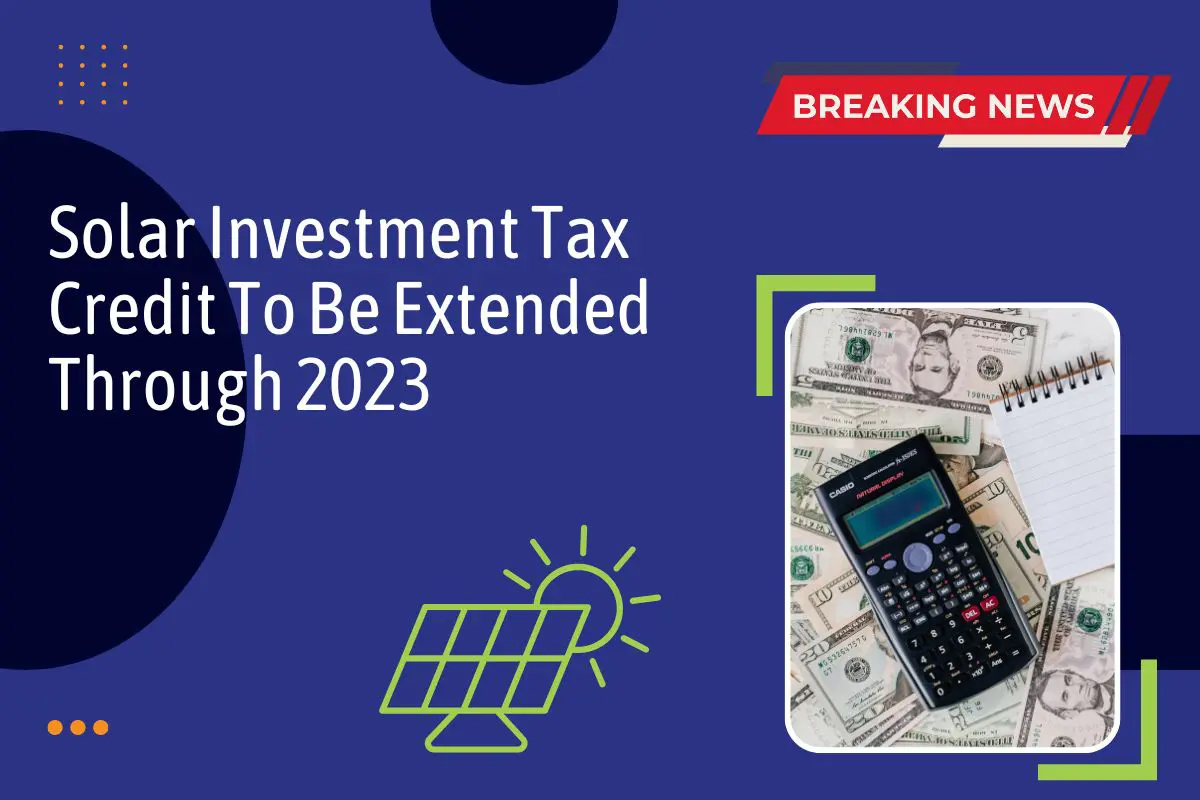The federal solar incentive for residential building-integrated photovoltaic (PV) systems is known as the Residential Renewable Energy Tax Credit, also referred to as the federal Investment Tax Credit (ITC). This incentive allows homeowners to deduct a portion of the cost of their building-integrated PV system from their federal taxes.
Under the current guidelines, the ITC provides a 26% tax credit for residential solar installations, including building-integrated PV systems. This means that homeowners can deduct 26% of the total system costs (including installation) from their federal tax liability. For example, if a building-integrated PV system costs $20,000, the homeowner could receive a tax credit of $5,200 (26% of $20,000).
It’s important to note that the ITC is subject to change and may be phased out or reduced in the future. Therefore, homeowners considering a building-integrated PV system should consult with a tax professional or the Internal Revenue Service (IRS) for the most up-to-date information on incentives and eligibility requirements.
Below is a list of all 50 US States with their current “State Solar Incentives” if any. This list was last updated August 28th 2023.
| STATE | State Solar Incentives (if applicable) | |
| Alabama | Alabama does not currently have any specific state-level solar incentives. | |
| Alaska | Alaska does not currently have any specific state-level solar incentives. | |
| Arizona | Arizona offers a Residential Solar Energy Credit, which allows homeowners to claim a tax credit of up to $1,000 for the installation of a solar energy system. Additionally, the state has a Property Tax Exemption for solar energy systems, ensuring that the added value of the system does not increase property taxes. | |
| Arkansas | Arkansas offers the Solar Energy Systems Tax Credit and the Property Tax Exemption for Solar Energy. | |
| California | California offers a Residential Renewable Energy Tax Credit, which provides a tax credit of 30% of the system cost, up to $5,000. Additionally, there is a Property Tax Exclusion for solar energy systems, ensuring that the added value of a solar energy system does not raise property taxes. | |
| Colorado | Colorado offers a Residential Renewable Energy Tax Credit, which provides a tax credit of 30% of the system cost, up to $2,000 for solar energy system installations.he state also has a Net Metering program, which allows homeowners to receive credits on their utility bills for excess electricity generated by their solar system. | |
| Connecticut | Connecticut offers a Residential Solar Investment Program, providing performance-based incentives for homeowners who install eligible solar energy systems. The incentives are based on the amount of electricity generated by the system. The state also offers a property tax exemption for solar energy systems and a sales tax exemption on the purchase of solar energy systems.. | |
| Delaware | Delaware offers a Green Energy Program, providing grants and rebates for solar energy system installations. | |
| Florida | Florida offers the Property Tax Exclusion for Residential Renewable Energy | |
| Georgia | Georgia offers a state income tax credit of up to 35% of the cost of a solar installation. | |
| Hawaii | Hawaii offers a combination of state and local incentives, including the Hawaii Energy Tax Credit and the Green Energy Money Saver Program. | |
| Idaho | Idaho offers a residential solar energy system tax credit, allowing taxpayers to claim a credit of up to 40% of the installed cost of a solar system. | |
| Illinois | Illinois offers a state-wide Solar Renewable Energy Credits (SRECs) program, where homeowners can earn credits for the electricity generated by their solar energy system. These credits can be sold to utilities or used to offset the homeowner’s The Adjustable Block Program (ABP) in Illinois provides incentives for solar installations through block grants. The ABP offers up-front payments based on the size of the system, with larger payments for smaller systems. electricity bills. The Adjustable Block Program (ABP) in Illinois provides incentives for solar installations through block grants. The ABP offers up-front payments based on the size of the system, with larger payments for smaller systems. | |
| Indiana | Indiana offers a Residential Solar Energy System Credit, providing a tax credit equal to 30% of the system cost, up to $1,000. | |
| Iowa | Iowa offers the Solar Energy System Tax Credit and the Solar Energy System Tax Exemption. | |
| Kansas | Kansas provides an income tax credit for the installation of a solar or wind energy system. | |
| Kentucky | Kentucky offers a state income tax credit of up to 30% of the cost of a solar installation. | |
| Louisiana | Louisiana offers a tax credit for solar energy systems, covering up to 50% of the cost, with a maximum credit of $12,500. | |
| Maine | Maine offers a state income tax credit of up to 40% of the cost of a solar installation. | |
| Maryland | Certainly! Here’s a list of state solar incentives in the United States: | |
| Massachusetts | Massachusetts offers the Residential Renewable Energy Income Tax Credit, the Solar Massachusetts Renewable Target (SMART) Program, and the Solar Loan Program. | |
| Michigan | Alabama: Alabama does not currently have any specific state-level solar incentives. | |
| Minnesota | Alaska: Alaska does not currently have any specific state-level solar incentives. | |
| Mississippi | Arizona: Arizona offers the Residential Solar and Wind Energy Systems Tax Credit and the Solar Equipment Sales Tax Exemption. | |
| Missouri | Arkansas: Arkansas offers the Solar Energy Systems Tax Credit and the Property Tax Exemption for Solar Energy. | |
| Montana | California: California offers a variety of incentives, including the California Solar Initiative, Net Energy Metering, and the Residential Renewable Energy Tax Credit. | |
| Nebraska | Colorado: Colorado offers the Residential Renewable Energy Tax Credit and the Solar*Rewards Program. | |
| Nevada | Connecticut: Connecticut offers the Residential Solar Investment Program and the Residential Solar Lease Program. | |
| New Hampshire | Delaware: Delaware offers the Green Energy Program and the Solar Renewable Energy Credits (SRECs) program. | |
| New Jersey | Florida: Florida offers the Property Tax Exclusion for Residential Renewable Energy Property and the Renewable Energy Technologies Property Tax Exemption. | |
| New Mexico | Georgia: Georgia offers the Solar Easements and the Clean Energy Property Tax Credit. | |
| New York | Hawaii: Hawaii offers the Renewable Energy Technologies Income Tax Credit and the Green Energy Money Saver Program. | |
| North Carolina | Idaho: Idaho offers the Residential Alternative Energy Tax Deduction and the Solar Energy Systems Tax Credit. | |
| North Dakota | Illinois: Illinois offers the Solar Renewable Energy Credit Program and the Adjustable Block Program. | |
| Ohio | Indiana: Indiana offers the Residential Solar Property Tax Deduction and the Net Metering Program. | |
| Oklahoma | Iowa: Iowa offers the Solar Energy System Tax Credit and the Solar Energy System Tax Exemption. | |
| Oregon | Oregon offers the Residential Energy Tax Credit, the Oregon Solar + Storage Rebate Program, and the Community Solar Program. | |
| Pennsylvania | These are just a few examples. Each state has its own set of incentives, so it’s important to research specific programs and requirements in your state of interest. | |
| Rhode Island | Rhode Island offers the Renewable Energy Growth Program, which provides financial incentives for solar installations. | |
| South Carolina | South Carolina offers a Solar Energy Income Tax Credit, providing a credit equal to 25% of the system cost or $3,500, whichever is less.The state also offers a property tax exemption for solar energy systems and a sales tax exemption on the purchase of solar energy systems. | |
| South Dakota | South Dakota has a property tax exemption for renewable energy systems, including solar. | |
| Tennessee | Tennessee offers the Solar Panel Tax Exemption, which exempts the added value of a solar system from property tax assessment. | |
| Texas | Texas offers a solar exemption from sales tax, making the purchase of solar energy systems tax-free. | |
| Utah | Utah offers a Residential Renewable Energy Systems Tax Credit, which provides a tax credit equal to 25% of the system cost, up to $1,600 for residential solar energy installations.The state also has a Solar Rights Law which protects a homeowner’s right to install a solar energy system on their property. | |
| Vermont | Vermont offers a Residential Renewable Energy Tax Credit, providing a tax credit of 26% of the system cost, up to $5,000 for solar energy system installations.The state also offers a property tax exemption for solar energy systems, ensuring that the added value of the system does not increase property taxes. | |
| Virginia | Virginia offers a Solar Energy Equipment Tax Exemption, which exempts the added value of a solar energy system from property taxes. | |
| Washington | Washington offers the Renewable Energy System Cost Recovery Program, the Sales and Use Tax Exemption for Renewable Energy Systems, and the Production Incentive Program for solar installations. | |
| West Virginia | West Virginia offers the Alternative and Renewable Energy Portfolio Standard Program, which provides incentives for renewable energy, including solar installations. | |
| Wisconsin | Wisconsin offers a Focus on Energy Program, which provides financial incentives and grants for solar energy projects. | |
| Wyoming |

